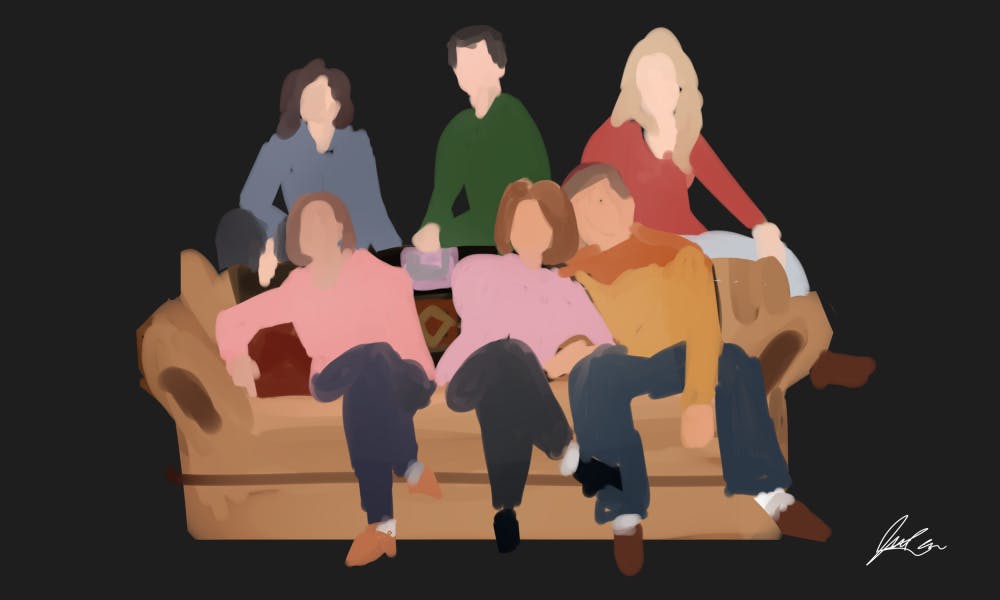Roseanne, a much–beloved sitcom that ran from the late ‘80s to the late ‘90s, is back on air. Maybe you already knew this because you’re a devout follower of ABC Family's comedy lineup (which has produced hits like Black–ish and Fresh Off The Boat). If your life in this American political hellscape is anything like mine though, you probably found out that Roseanne is back because of the Internet outrage that’s been brewing since the show premiered.
During Roseanne’s first run, it was lauded for its cultural saliency and its realistic depiction of life in a blue–collar family, but the revival has drawn serious criticism. The outrage centers around the fact that Roseanne—both the character of Roseanne Conner and her real–life actress, comedian Roseanne Barr—outspokenly supports President Donald Trump. The real life Roseanne has also drawn criticism for, among other things, peddling conspiracy theories about child molestation and the March For Our Lives leaders, and for a photoshoot where she dressed up like Hitler. Liberal comedians and celebrities seem divided on the show: Sarah Silverman “loved it,” while Kumail Nanjiani said he wouldn’t be watching. Cultural critic Roxane Gay, for her part, published an intriguingly titled opinion piece in The New York Times: “The ‘Roseanne’ Reboot Is Funny. I’m Not Going To Keep Watching.” As I read through the piece, I fixated on the word “funny." Could a television show be comical and well–done, and also be something that I, personally, found politically or morally reprehensible? I wanted to find out for myself.
I'm your typical college liberal. I proudly call myself a feminist, I follow Greenpeace on Twitter, and I started going to rallies for Democratic candidates before I could legally vote for them. Even so, though I’m not exactly in Roseanne’s target audience, I am not that far removed from it. I grew up in a conservative, religious county in Michigan; I have high school friends and family members who cast votes for Trump. And maybe that’s why, even though I never saw the original series, I felt a warm familiarity when I watched the first few episodes of the revival. The laughs of the live studio audience felt anachronistic, but not annoying like they would be on any new production. The characters, particularly Dan Conner (played with charm by John Goodman) and the fierce Aunt Jackie (Laurie Metcalf) are endearing and likable and feel like people I know. Watching Roseanne felt like pulling on a knitted sweater, or like coming home for Thanksgiving dinner table fights about politics and all.
In the book Republican Like Me, former NPR CEO Ken Stern takes a sociological odyssey through the conservative enclaves of the country. In it, Stern cites a study which found that in Virginia the majority of Clinton supporters said they had no close friends or family who supported Trump, and vice versa. Virginia is one of the most politically divided states in the country with almost a 50/50 split in the 2016 election. It's undeniable that our country is ideologically divided and many people have misconceptions about the ideological makeup of America. In my review of Queer Eye, I praised the Netflix revival for trying to heal the divides of America today, and it doesn’t escape me that Roseanne is trying to do the same thing. But with Roseanne, where compassionate but conservative ideology ultimately wins out, I was left uneasy—and I don’t know if that makes me principled or close–minded, or both.
Ultimately, I watched Roseanne in an attempt to divorce my political opinions from my cultural tastes. I wanted to write this like I was reviewing another standard issue ABC Family feel–good sitcom, but I was doomed to fail from the start. I can’t treat Roseanne like just another sitcom because it’s never been just another sitcom. After all, the reason that the old Roseanne was so widely adored was its cultural relevance and honesty. And if I’m being brutally honest, the small, hateful, partisan part of my heart wanted to watch Roseanne and find an objective reason to dislike it. I listened for bad writing, watched hawkishly for bad acting, and laughed at well–crafted jokes with reluctance. I wanted to find something high–minded to hate, something aside from its politics that made me dislike Roseanne, and as hard as I tried, I came up with nothing.
That’s not a defense of the show or a call on whether or not you should tune in. I don’t know if Roseanne is a tool for bridging a deeply divided America or an insidious way of normalizing bigotry, and I don’t think I’m the person who will figure it out. I am insulated by the privilege of never belonging to a group that was attacked by the star and warmed by fond memories of people I love who sit across the aisle. Maybe as a result of that, I was able to hesitantly enjoy Roseanne—as long as I stayed off of Twitter while I watched it.

